#this is what the american empire really is
Text
"Ramadan is a special time of year for Muslims around the world. It is a month that brings families, communities and entire countries together. For me, it was always a time of peace, spiritual dedication and reflection, and family bonding.
I remember fasting since I was a little child. My mother started training me when I was five years old, first having me complete half-day fasts. Then when I turned seven, I was able to do a full-day one, which earned me a lot of praise from family and friends.
As kids, we would stick out our tongues to each other to prove that we were fasting. A red tongue meant no fasting; a white and dry one, however, was a definite sign of it.
Most of the year my father worked abroad to provide for the family, and my mother was the one who raised and took care of us. In Ramadan, however, my father would come back to be with us.
We would start getting ready for iftar before sunset and my dad would sometimes cook the food. We would prepare special dishes, exchange food with other families and give it away to the poor. After dinner, we would go to the mosque to pray the nightly tarawih prayers.
We loved the special atmosphere Ramadan had and we all waited impatiently for this month to come each year.
In 2001, after I was sold to the CIA by local warlords in Afghanistan, I spent my 18th Ramadan in a black site – naked, blindfolded, and chained all day in a cold, dark cell under the ground. The American agents would blast loud music constantly and would only stop it when they would take me out for an interrogation. I didn’t – and couldn’t – know when Ramadan started, as I had no way to estimate the time of day.
I was given a “meal” every other day which basically involved soldiers pushing food and water into my mouth, feeding me “Meals Ready to Eat” (MREs). There was no going to the toilet, I defecated where I was chained. I lost so much weight that I passed out and I was given intravenous transfusions every few days.
Still, I wanted to observe Ramadan and decided that whenever they fed me, it was when I broke my fast. When I told the interrogators that I needed to fast because I thought the holy month had started, they mocked me.
By the time my 19th Ramadan came, I had already been transferred to Guantanamo along with hundreds of other Muslims. We were quite a diverse group; some 50 nationalities were represented and 20 languages spoken.
We were so isolated that we didn’t realise it was Ramadan until the Muslim chaplain came and told us. It turned out we weren’t supposed to know the time and date, as it was a “matter of camp security and safety”.
“Ramadan Kareem, Ramadan Mubarak”, we congratulated each other in different languages. We all knew that Ramadan was going to be hard, given the living conditions in the camp.
The guards made it difficult to fast, serving food not before sunrise and after sunset – when we would start and break our fast – but when they decided to.
We would take the food and try to hide it so we could eat later, but the guards kept conducting cell searches and punished anyone who hid food by putting them in solitary confinement and depriving them of food.
So we decided simply to refuse to eat. We spent a few days not eating and asked them to bring the food on time, threatening to go on a collective hunger strike. After a few days, they gave us two meals, one before dawn and the second after sunset.
But then the guards started intentionally delaying our meals and would even steal from them. The MREs we were given were already meagre – we even called them “Meals that Refused to Exist” – and still they always took what they liked from them, usually the sweets.
We literally starved during this time.
When we tried to do a long nightly tarawih prayer, the guards didn’t let us. They told us we were allowed to pray only five times a day and could not pray collectively. While we stood to pray, they harassed and mocked us, and conducted cell searches. The guards knew that we can’t talk while praying, yet they considered this a refusal to respond and punished us for it.
If anyone didn’t respond, the guards would call the Immediate Reaction Force (IRF) team to forcibly extract a prisoner from his cell even while praying. Interrogations doubled during that Ramadan to intimidate us even more.
At one point, the interrogators started a new tactic to divide the prison population by offering to move prisoners to a quiet block if they cooperated with them. None of us bought into this; we stayed united and did things our own way.
Apart from the many challenges we faced during our first Ramadan in Guantanamo, we also spent the holy month thinking a lot about our families and homes, we missed them and missed observing Ramadan with them.
But we also realised that we had a new family – one big Guantanamo family. We talked about the different Ramadan traditions we had back home and the food we cooked. The beautiful memories we shared brought happiness and made us appreciate the holy month even more.
And so the Ramadans in detention rolled on, one after the other. We always prayed for freedom and justice, not only for ourselves but for everyone in the world who was unjustly imprisoned and oppressed.
When the holy month would come, we would sometimes be caged in solitary confinement. At other times we were in open cages where we could pass food to each other. When there was no food, or it was served too late, prisoners would share a single date or one apple or a slice of bread they managed to hide from the guards.
Sometimes the food would return to the person who first passed it on because each prisoner wanted his brother to eat first. Such moments filled my eyes with tears. Waddah, a Yemeni prisoner, was known to only eat one meal a day and would always send his meals to other prisoners, to those who starved. “I can’t bear seeing my brothers starve,” he told me. This tender man did not make it alive out of Guantanamo.
In 2006, we had one of the hardest holy months.
We were a year into our collective hunger strike, for which we were punished by being brutally force-fed. The camp administration had made rules even harsher and our living situation had worsened. The appointment of Lt Ron DeSantis – the present governor of Florida – as Judge Advocate General to supposedly ensure we are treated humanely did not make a difference
Three months before the start of Ramadan, three of our brothers – Yassir, Ali and Mana’i – died. The camp administration said they committed suicide; we knew they were lying. Two of them were approved to be released from Guantanamo; why would they take their own lives? While an official investigation by the US government maintained that the deaths were suicides, people who investigated the matter separately, including a former guard, suspected that our brothers were killed during torture.
That Ramadan, we fasted and prayed with broken hearts.
The following year, we spent the holy month in solitary confinement. The camp administration pressed on with brutal force-feeding but at least we managed to convince them to do it before dawn and after sunset to observe fasting times.
The situation continued like that till 2010, when the Obama administration decided to slightly improve our living conditions, having failed to close Guantanamo, America’s black hole. We negotiated with the camp administration to allow communal living in return for an end to the hunger strike.
That year we had one of our best Ramadans. I still remember the day it started – it was August 11, 2010. We had better food, refrigerators and microwaves, and our families and lawyers sent us spices and sweets. Prisoners from different countries cooked their dishes and shared them with everyone.
Each two blocks out of the six housing prisoners were allowed to be together during Ramadan, so we had a collective iftar every day. We shared our food with some guards and camp staff who liked it.
We were free to be together 24 hours a day so we could do all our prayers together. For the first time, we felt it was Ramadan, although we were away from our families. Some of the guards tried to fast too, we encouraged them and prepared special food for them.
During Ramadan in 2011, there was a Muslim navy guard who would always pray and fast with us. He would join us for iftar and we became very close friends. He contacted me this year and we said Ramadan Mubarak to each other.
As I mark my seventh Ramadan as a free man, I still think of my brothers, my big Guantanamo family, and the many holy months we spent together.
This Ramadan, 31 men are breaking their fasts in Guantanamo without their families, far away from their homes, having been imprisoned for more than two decades. Seventeen of them have been cleared for release.
We must not rest until all of them are free and are able to sit at the iftar table with their loved ones."
-Mansoor Adayfi, held captive by Americans for 14 years without charge
#us politics#i dare you to tel me how bad it is to be american because you dont have healthare#this is what the american empire really is#i still have the abu graib human sex pyramid images from the 7pm news seared into my brain 20 years later
76 notes
·
View notes
Text
[D]omesticated attack dogs [...] hunted those who defied the profitable Caribbean sugar regimes and North America’s later Cotton Kingdom, [...] enforced plantation regimens [...], and closed off fugitive landscapes with acute adaptability to the varied [...] terrains of sugar, cotton, coffee or tobacco plantations that they patrolled. [...] [I]n the Age of Revolutions the Cuban bloodhound spread across imperial boundaries to protect white power and suppress black ambitions in Haiti and Jamaica. [...] [Then] dog violence in the Caribbean spurred planters in the American South to import and breed slave dogs [...].
---
Spanish landowners often used dogs to execute indigenous labourers simply for disobedience. [...] Bartolomé de las Casas [...] documented attacks against Taino populations, telling of Spaniards who ‘hunted them with their hounds [...]. These dogs shed much human blood’. Many later abolitionists made comparisons with these brutal [Spanish] precedents to criticize canine violence against slaves on these same Caribbean islands. [...] Spanish officials in Santo Domingo were licensing packs of dogs to comb the forests for [...] fugitives [...]. Dogs in Panama, for instance, tracked, attacked, captured and publicly executed maroons. [...] In the 1650s [...] [o]ne [English] observer noted, ‘There is nothing in [Barbados] so useful as … Liam Hounds, to find out these Thieves’. The term ‘liam’ likely came from the French limier, meaning ‘bloodhound’. [...] In 1659 English planters in Jamaica ‘procured some blood-hounds, and hunted these blacks like wild-beasts’ [...]. By the mid eighteenth century, French planters in Martinique were also relying upon dogs to hunt fugitive slaves. [...] In French Saint-Domingue [Haiti] dogs were used against the maroon Macandal [...] and he was burned alive in 1758. [...]
Although slave hounds existed throughout the Caribbean, it was common knowledge that Cuba bred and trained the best attack dogs, and when insurrections began to challenge plantocratic interests across the Americas, two rival empires, Britain and France, begged Spain to sell these notorious Cuban bloodhounds to suppress black ambitions and protect shared white power. [...] [I]n the 1790s and early 1800s [...] [i]n the Age of Revolutions a new canine breed gained widespread popularity in suppressing black populations across the Caribbean and eventually North America. Slave hounds were usually descended from more typical mastiffs or bloodhounds [...].
---
Spanish and Cuban slave hunters not only bred the Cuban bloodhound, but were midwives to an era of international anti-black co-ordination as the breed’s reputation spread rapidly among enslavers during the seven decades between the beginning of the Haitian Revolution in 1791 and the conclusion of the American Civil War in 1865. [...]
Despite the legends of Spanish cruelty, British officials bought Cuban bloodhounds when unrest erupted in Jamaica in 1795 after learning that Spanish officials in Cuba had recently sent dogs to hunt runaways and the indigenous Miskitos in Central America. [...] The island’s governor, Balcarres, later wrote that ‘Soon after the maroon rebellion broke out’ he had sent representatives ‘to Cuba in order to procure a number of large dogs of the bloodhound breed which are used to hunt down runaway negroes’ [...]. In 1803, during the final independence struggle of the Haitian Revolution, Cuban breeders again sold hundreds of hounds to the French to aid their fight against the black revolutionaries. [...] In 1819 Henri Christophe, a later leader of Haiti, told Tsar Alexander that hounds were a hallmark of French cruelty. [...]
---
The most extensively documented deployment of slave hounds [...] occurred in the antebellum American South and built upon Caribbean foundations. [...] The use of dogs increased during that decade [1830s], especially with the Second Seminole War in Florida (1835–42). The first recorded sale of Cuban dogs into the United States came with this conflict, when the US military apparently purchased three such dogs for $151.72 each [...]. [F]ierce bloodhounds reputed to be from Cuba appeared in the Mississippi valley as early as 1841 [...].
The importation of these dogs changed the business of slave catching in the region, as their deployment and reputation grew rapidly throughout the 1840s and, as in Cuba, specialized dog handlers became professionalized. Newspapers advertised slave hunters who claimed to possess the ‘Finest dogs for catching negroes’ [...]. [S]lave hunting intensified [from the 1840s until the Civil War] [...]. Indeed, tactics in the American South closely mirrored those of their Cuban predecessors as local slave catchers became suppliers of biopower indispensable to slavery’s profitability. [...] [P]rice [...] was left largely to the discretion of slave hunters, who, ‘Charging by the day and mile [...] could earn what was for them a sizeable amount - ten to fifty dollars [...]'. William Craft added that the ‘business’ of slave catching was ‘openly carried on, assisted by advertisements’. [...] The Louisiana slave owner [B.B.] portrayed his own pursuits as if he were hunting wild game [...]. The relationship between trackers and slaves became intricately systematized [...]. The short-lived republic of Texas (1836–46) even enacted specific compensation and laws for slave trackers, provisions that persisted after annexation by the United States.
---
All text above by: Tyler D. Parry and Charlton W. Yingling. "Slave Hounds and Abolition in the Americas". Past & Present Volume 246, Issue 1, pages 69-108. February 2020. [Bold emphasis and some paragraph breaks/contractions added by me.]
#abolition#its first of february#while already extensive doumentation of dogs in american south in 1840s to 60s#a nice aspect of this article is focuses on two things#one being significance of shared crossborder collaboartion cooperation of the major empires and states#as in imperial divisions set aside by spain britain france and us and extent to which they#collectively helped each other crush black resistance#and then two the authors also focus on agency and significance of black resistance#not really reflected in these excerpts but article goes in depth on black collaboration#in newspapers and fugitive assistance and public discourse in mexico haiti us canada#good references to transcripts and articles at the time where exslaves and abolitionists#used the brutality of dog attacks to turn public perception in their favor#another thing is article includes direct quotes from government and colonial officials casually ordering attacks#which emphasizes clearly that they knew exactly what they were doing#ecology#indigenous#multispecies#borders#imperial#colonial#tidalectics#caribbean#carceral geography#archipelagic thinking
21 notes
·
View notes
Text
HDS lecture a while ago that i didnt agree with 100% btu the interesting point was how almost every like cultural appropriation trend in religion was disseminated basically as a sale between two culturally xtian white ppl. trends like yoga and sweat lodges are almost never arbitrated by people from the groups who originated them. i think its very different if you’re like interacting with a person/group of minority ethnic/religious people & experiencing their culture through them in which they have the power to define boundaries and tell their own story vs if youre trying to like laser-cut out culture and like take it for your own. its notable that a lot of the cultural appropriation that really makes us grimace the hardest is when its something which has been forcibly divorced from its cultural context. having ur culture taken from u and misrepresented and sold for someone elses profit is very different from feeling that its valuable and desirable and ppl are excited and grateful for u to give them the opportunity to experience it. ppl and culture are inseparable n trying to separate them is an inherently violent act <3
#i cant figure out how to make this post less than 19 paragraphs but say what im trying to say#bc theres so many layers to it#and i have so many specific examples#abigail washburn and wu fei's collaboration album feels so special because like it genuinely just feels like two musicians sharing their#traditions with eachtoher#(i think its notable that theyre both women)#whereas i have a largely negative reaction to a lot of the offerings that are like. singing/playing british/american folk songs but with#like a sitar in the background. even when its an indian guy playing the sitar.#the imagined village doing this very ooohhh queering tradition thing but then the repertoire is ALLL english#i thought that was like so on the nose lol#also when people think that cultures arent like. formed in the first place through borrowing things from eachother lol#the idea of like a pure nucleaic culture which later mutates or is distorted or is mixed is like#1. widely discredited and 2#2. fascist#lol#its not just that they can mix its that they are literlaly inherently mixed and formed from hybridity#theres NO non-hybrid culture#also comparisons between modern imperialism and the movements of past empires are really messy but thats a different post
3 notes
·
View notes
Text

Twitter
#songs are meant to be heard so dear listener wouldn't be out of place#kermit being the literati that she is says it's a subversion of a preface#advice columns letters to the editor fans' mailbags and the like used to be more ubiquitous#some are still around like modern love but most have been replaced by podcasts#pouring out my heart to a stranger 🤝 goin' crazy for anyone who would listen to my stories 🤝spilling out to you for free#there was no use for the pseudonym anymore so why bring it out of the problem attic again?#maybe it's because (some) wouldn't take (her™️) word for it if (they) knew who was really talking™️ 🤷🏻♀️🥂#yes last night why wouldn't we get along? she's cool she's a brooklyn baby 😝#what was that famous rep line pics or it didn't happen? 😉#they literally thought i was being serious™️? oh man this is why kermit said she almost feels bad for them 🤣#happy for the guys earning their 5th consecutive number 1 album#never doubted the 1M when they work together we get magic™️ when they don't we still get magic but mostly a compelling need for therapy™️#(lurkers this is sarcasm since it seems you still cannot tell)#repetition is advertising 101 🍀#i wrote what i wrote american f1 driver soon if it's not the logan guy it'll be someone else because mouse™️ empire contract 🏁#kermit's mailbag#originanon
2 notes
·
View notes
Text
cant even articulate it man its the its the. its the. Okay So There’s This Thing Called Pioneer Theory,
#ill spare you the essay but the long an dshort of it is#pioneer theory describes this like early japanese american immigrant ideology about the nature of their oppression#seeing ones self as a civilized people from a noble empire taming a wild and foreign land#trying to find recognition and legitimacy in the eyes of the Powers That Be#both 'back home' overseas and in the new home the U.S.#so. The Inherent Thorniness Of Being From One Imperial Power and Coming Over To Another#TWO imperial powers who will make you dance like a bear for crumbs and then crush you under their heel when its convenient#and what fucking gets me about it all as a mixed white + japanese american person is you inherit the baggage of TWO empires. two empires.#maybe even more than two empires#and i think we are put on this earth to grapple with that honestly and fearlessly#and to find shared ground with other dispossessed people#and basically what im saying is kishi bashi did that. he really did that. for all of us#just kidding. aha. the essay is in the tags now. have fun#love this desert
2 notes
·
View notes
Text
Every time I see something about Supernatural, I wonder how much of the current atheist attitude towards Christianity is rooted in people mistaking Supernatural for being well researched and intelligent.
#i saw someone say something like 'is jesus be embarrassed to be associated with the demiurge known as the christian god' and it's like#JESUS OF NAZARETH LITERALLY STARTED A CULT#HE WAS A JEWISH MAN WHO STARTED A CULT THAT KICKED OFF CHRISITIANITY#THE CHRISTIAN GOD IS LITERALLY HIS TAKE ON GOD#is is CALLED THE CHRISTIAN GOD *AFTER HIM*#also that's not even what the demiurge is like#the demiurge-as-god concept really only applies to the old testament god#(and subsequently might be rooted in antisemitisim tbh)#and the demiurge as a whole concept IS SUBSERVIENT TO THE SUPREME BEING and THAT is if you accept that particular branch of gnosticism#(though adding on to the demiurge-as-god thing . . . it also is interesting to me specifically because not only does it reflect#jesus (the son) usurping yahweh (the father)#but yahweh had a son name el and el is where we get all those such-and-such of god names so it's. . . el (the son) usurping the father#(yahweh) and jesus (the son) usurping the father (god) and it's just part of an endless cycle of sons usurping fathers because it is#in the nature of children to eventually wrestle empires from their parents#idk how el might appear in the testaments i'm pretty much only familiar with him in the context of the caulish pantheon and there very#loosely but i just think it's neat how humanity tells the same universal stories with different names over and over across time and space#and then we fight over it???? for some reason????#also this is no shade to supernatural this is 100% shade to the people who try to use supernatural lore in place of researching#shit like djinn and faerie changelings#supernatural is an AMERICAN BASED HORROR SERIES so the folklore is presented THROUGH THAT LENS#and because of that the biblical stuff is ALSO HEAVILY ROOTED in discussion of the effect evangelicalism and purity cults have on people#it is NOT a be all end all dictionary of occult lore
0 notes
Text
just a silly little thought but 💛 i just love the concept of rhea sort of being this, like, almost mythical creature. she exists mainly as a gossip, as a rumour. everyone just knew her as da3mon's unwanted wife, the "good and honourable lady of the vale who was so wronged by her husband", or the crazy bronze bitch who must've been so dull or so annoying or so torturous for her husband to endure. did the prince really marry? did anyone even remember the event? maybe it's just a group hallucination or a collective fever dream; maybe there was no rhea royce for how absent she was in the court, in the prince's life. much like how we were mislead with words when we first heard of her the first few episodes. and then she shows up and she's the most normal human being in existence. honourable, yes, a bit snobbish as well — but what lord isn't — but no fangs, nothing particularly horrid or wretched about her appearance. just a simple woman doing simple things.
#the last great american dynasty rlly got 2 me on this one#like imagine being known as the resident ghost / mythical creature / poltergeist-ish reputation#does she even exist? is she truly da3mon's monster? or is she so horrible that he'd rather fuck sheep ?#and then shes just.... some random woman skjdfhsjdhubw#she never? tries to tempt down the rumours#she knew what was spoken abt her. and she just... does nothing#just like the whole of this dragon empire — she knows she cannot defeat them; cannot defy them; protest them.#so she ebbs. she flows. she makes due with what she's given instead#never quite aspired to be noticed; but refusing to give in.#oh god just. the lyrics: 'who knows if i never showed up what could've been?#there goes the loudest woman this town has ever seen!#i had a marvellous time ruining everything.'#but do u really KNOW her? do you? IS she loud? DID she want to ruin everything?#everything abt her is heresay.#u do not know her. neither does her husband. does the world?#GOD I LOVE HER#UGH!!!!!!#GENERAL: OUT OF CHARACTER.
1 note
·
View note
Text
Some historical context for Olrox
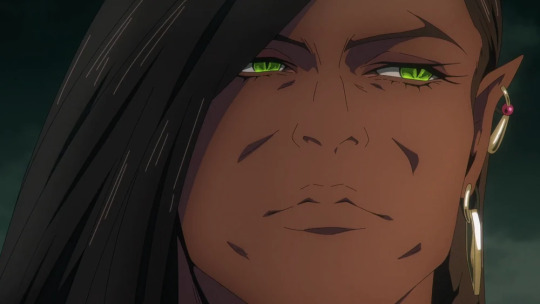
Okay, let me prephase this with one important message: Castlevania Nocturne made me really happy by making the plot all about colonialism, as colonialism and its fallout and how it influences us to this day is a topic that I am very passionate about. We do not talk enough about it. The US does not talk enough about it because it could make white people feel uncomfortable. And here in Germany we do not talk about it, because we act as if this had nothing to do with us at all.
But the show talks about it and I love it.
And I honestly also gotta say that I love that the BI_PoC character have a concrete cultural heritage. Olrox is Aztec, Annette is Yoruba, and Drolta is Egyptian. Other shows: Please take notes!
But let's talk Olrox, because he is so fucking interesting and amazing!
We know about him that he is Aztec and also that he is 250 years old. Or roughly that old by the time he kills Julia. Which would put either his birth or his turning somewhere around 1530.
Now, the fall of the Aztec Empire has a very exact date: August 13th, 1521. But you should keep in mind that this does not mean that on that day the Aztec's are extinct. To this day there is still 1,5 million people speaking Nahuatl, the language of the Aztecs, and preserving some of the Aztec cultural traditions. It was just that on that day the empire construct fell to Cortez and the Spaniad conquistadors and a lot of Aztecs went into exile to flee the genocide that Cortez was bringing upon them.
The question of course is: Was Olrox still human at this time or was he already a vampire? From his dialogue it is clear that he was at least alive and grown enough to remember the fall of the empire and the distruction Cortez and his men brought upon them. But you can bet it was very traumatic.
I also am assuming he was turned by a white man. Because so far my assumption is that vampirism is an old world thing that got brought to the new world through colonialism. (Mostly because in Dracula's court we do not see any new world vampires.)
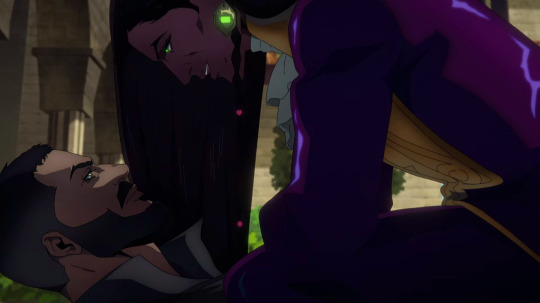
Now, the other interesting thing is what he says about his dead lover. The one Julia killed. So, first the "town in Massachusetts" he speaks about is clearly Stockbridge. Which was the town in which many Mohicans have settled during the colonial times, as well as other people from the Iroquois Nations. Now, it should be noted that the Mohicans were not part of the Iroquois alliance and in fact went to war with the Iroquois, but by the time colonialism really geared up there was some cooperation between the Mohicans and Iroquois.
Due to this they were in an alliance with the Oneida (who were part of the Iroquois) by the time of the Revolutionary war. Now, the Revolutionary War created a lot of conflict between the Iroquois nations, because they did not agree which side they should fight on. Of course both sides promised that they could keep their land, but the Mohawk, Onondaga, Cayuga, and Seneca did not trust the colonists and hence sided with the British, while the Oneida and Tuscarora (and through them also the Mohicans) sided with the Colonists.
And the dead lover clearly was among those siding with the colonists. Now, a quick refresher for the non-Americans (and the Americans who slept to history class, which is understandable). The Revolutionary War lasted from April 19, 1775 to September 3, 1783 (which, yes, also means that Julia and Richter probably were in the US during the war the entire time and the "evil" Julia was fighting probably was linked to it). And of course we all know how it ended for the Indigenous people: The colonists won, countless Indigenous folks died on both sides, only to get booted of their land soon after. The Oneida und Mohicans were made to move westwards not soon after the war ended. So, yes, Olrox would have seen that happen.
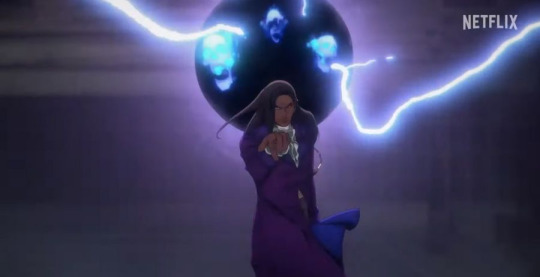
Now, an interesting thing in his dialogue was when Erzebet said: "We will create a new world." To which he replies: "I have heard that one before." And she says: "This time we are going to make it to last."
And the big question is to what this is refering. Is it refering to the colonialization or is it refering to the revolutionary war? Or something entirely different. In both cases it would be possible. And yes, the American Revolution definitely were claiming to create a new world. But was it that what he refered to or something else?
Well, never the less: Interesting character. Really good writing.
#castlevania#castlevania nocturne#castlevania netflix#castlevania nocturne spoilers#castlevania olrox#american history#history#colonialism#colonial history#aztec
4K notes
·
View notes
Text
I think a lot of the skepticism and derision toward the idea of "gifted kid burnout" stems from the fact that a lot of folks have no idea what the gifted track in most high schools actually looks like; they've got this mental image, possibly informed by popular media depictions, of "gifted kids" as a privileged group of students who get to go on extra field trips, monopolise the teachers' attention in class, and constantly be told how special they are, but who are otherwise treated identically to all the other kids.
In practice, the gifted track in most high schools – most North American high schools, at any rate – has the same problem as any other educational program: the need to adhere to published metrics. These programs exist for the benefit of students only insofar as those benefits can empirically be measured, which leads to several common outcomes:
Students on the gifted track being afforded fewer choices regarding elective classes – often to the extent of having no choices at all – in order to stream the highest-performing students into the subjects that are most valuable in terms of boosting institutional metrics.
Students on the gifted tracking receiving restricted access to educational resources such as tutoring because it's perceived as a waste of funding. In many cases, gifted students are not only denied access to tutoring, but expected to serve as volunteer tutors and teaching assistants themselves, effectively becoming a source of unpaid educational labour for the schools they attend.
Students on the gifted track being assigned considerably more homework, often literally doubling their workload in an environment where homework loads are already routinely high enough that kids have difficulty finding time to eat and sleep, simply because you get more measurable academic performance data that way.
The upshot is that the gifted track is often less about fun perks and constant praise, and more about receiving less freedom, fewer resources, and heavier workloads than one's peers, getting strong-armed into providing unpaid labour to the school on top of it, and constantly being told one should be grateful for it – and that's without touching on the fact that the unspoken secondary purpose of many gifted programs is to serve as a quarantine for all the neurodivergent kids the school couldn't find an excuse to institutionalise or expel.
Like, shit, there's a reason kids on the gifted track exhibit elevated rates of alcoholism and substance abuse compared to general student populations. That doesn't arise in a vacuum!
(To be clear, I'm not saying that people graduating from high school and immediately having an existential crisis upon realising they're not special after all isn't a thing that happens, but in my experience that's more usually something that happens to the kids who were on the football team, and reframing it as a nerd culture thing is really weird.)
7K notes
·
View notes
Text
one reason (white) queer people misuse the term homonationalism is that they see queerness (or whatever you want to call it) as naturally disaffiliated with the US empire. so they understand homonationalism as a divergence from a natural mutual antagonism between queerness and empire. they talk about homonationalism as if it's an exclusively "normie gay" project, and as if it's a divergence from, rather than a consequence of, the overall trajectory of western lgbtqia+ politics. ironically it’s that self-exceptionalization by the queer, on the basis of their queerness, that imbricates them in homonationalism. they produce themselves as a homonationalist subject, and reproduce homonationalism, every time they articulate their queerness as individualized freedom. and Puar actually anticipates all of this in her original theorization of homonationalism in Terrorist Assemblages, and that's why it really helps to go to the text instead of osmosing queer theory solely through tumblr posts (esp when tumblr is so white and the queer theorists are not):
"Some may strenuously object to the suggestion that queer identities, like their 'less radical' counterparts, homosexual, gay, and lesbian identities, are also implicated in ascendant white American nationalist formations, preferring to see queerness as singularly transgressive of identity norms. This focus on transgression, however, is precisely the term by which queerness narrates its own sexual exceptionalism.
While we can point to the obvious problems with the emancipatory, missionary pulses of certain (U.S., western) feminisms and of gay and lesbian liberation, queerness has its own exceptionalist desires: exceptionalism is a founding impulse, indeed the very core of a queerness that claims itself as an anti-, trans-, or unidentity. The paradigm of gay liberation and emancipation has produced all
sorts of troubling narratives: about the greater homophobia of immigrant communities and communities of color, about the stricter family values and mores in these communities, about a certain prerequisite migration from home, about coming-out teleologies. We have less understanding of queerness as a biopolitical project, one that both parallels and intersects with that of multiculturalism, the ascendancy of whiteness, and may collude with or collapse into liberationist paradigms. While liberal underpinnings serve to
constantly recenter the normative gay or lesbian subject as exclusively liberatory, these same tendencies labor to insistently recenter the normative queer subject as an exclusively transgressive one. Queerness here is the modality through which 'freedom from norms' becomes a regulatory queer ideal that demarcates the ideal queer. ... I am thinking of queerness as exceptional in a way that is wedded to individualism and the rational, liberal humanist subject, what [Sara] Ahmed denotes as 'attachments' and what I would qualify as deep psychic registers of investment that we often cannot
account for and are sometimes best seen by others rather than ourselves. 'Freedom from norms' resonates with liberal humanism’s authorization of the fully self-possessed speaking subject, untethered by hegemony or false consciousness, enabled by the life/stylization offerings of capitalism, rationally choosing modern individualism over the ensnaring bonds of family. In this problematic definition of queerness, individual agency is legible only as resistance to norms rather than complicity with them, thus equating resistance and agency.
... Queerness as automatically and inherently transgressive enacts specific forms of disciplining and control, erecting celebratory queer liberal subjects folded into life (queerness as subject) against the sexually pathological and deviant populations targeted for death (queerness as population). Within that orientation of regulatory transgression, queer operates as an alibi for complicity with all sorts of other identity norms, such as nation, race, class, and gender, unwittingly lured onto the ascent toward whiteness. ... To be excused from a critique of one’s own power manipulations is the appeal of white liberalism, the underpinnings of the ascendancy of whiteness, which is not a conservative, racist formation bent on extermination, but rather an insidious liberal one proffering an innocuous inclusion into life."
Jasbir K. Puar, Terrorist Assemblages: Homonationalism in Queer Times (2007)
1K notes
·
View notes
Text
I made a little clothing guide for some Dragon Age regions
Some may not be exactly the same as the references that appear in the game or in the concepts, but I wanted to give a little of my vision to the guide.
Ferelden
Ferelden is close to the Frostback Mountains and Orlais and as Leliana and Zevran once said, Ferelden is cold, so I thought it would be a cool idea to put on thick clothes with a lot of fur so the Fereldans can protect themselves from the cold.
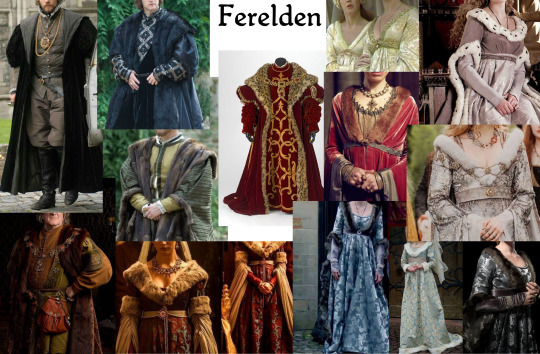
Tevinter
Dragon Age 4 is approaching and it's already evident that we're going to be in the Tevinter Imperium, so I discovered that a lot of Tevinter clothing was inspired by clothing from the Byzantine Empire
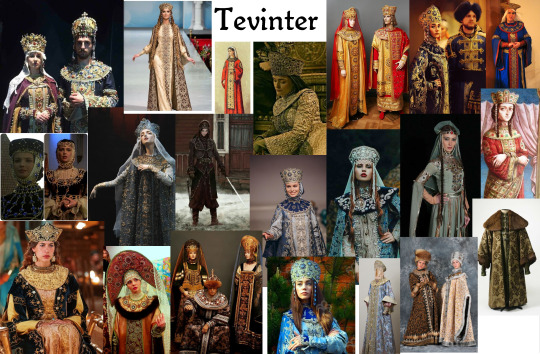
Orlais
We've already seen in the game and in the concept art that Orlais is all about being flamboyant and flashy and what's more flamboyant and flashy than mid-1500s fashion?
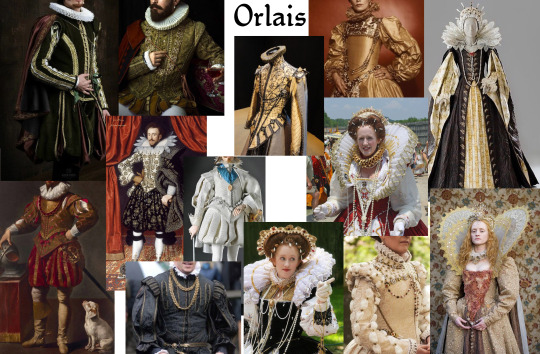
Antiva
Home to the two loves of my life, Zevran and Josephine, Antiva fashion is something I really love… The puffy arms, the breast-enhancing corsets, the leather vests, idk, I just like Antiva
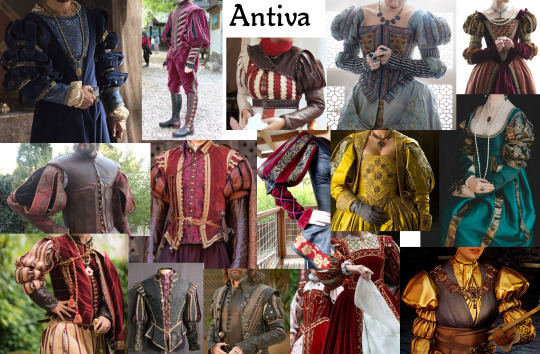
Nevarra
I don't exactly have much to say about nevarra, but I did some research and found some concepts that I thought were interesting, I also saw in some places that said that the kingdom was inspired by the traditional culture of Spain
So I'll leave two references here
One for the traditional clothes and one for what I imagine might look like Nevarra dress
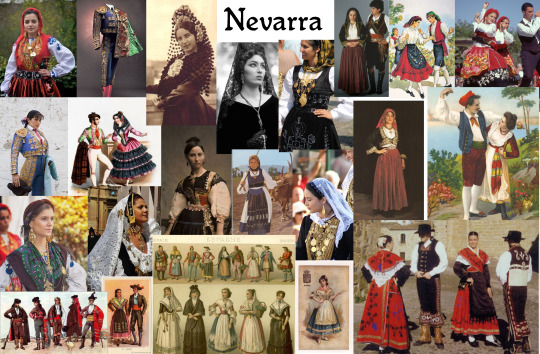
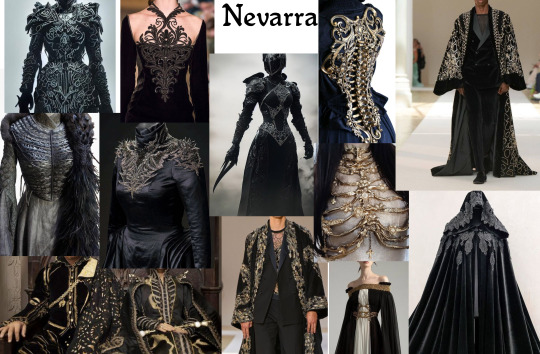
Frostback Basin
In Inquisition we can see that the clothes they wear are quite furry and well protected from the cold, so I think it would be a good idea to inspire some of their clothing in Inuit clothing
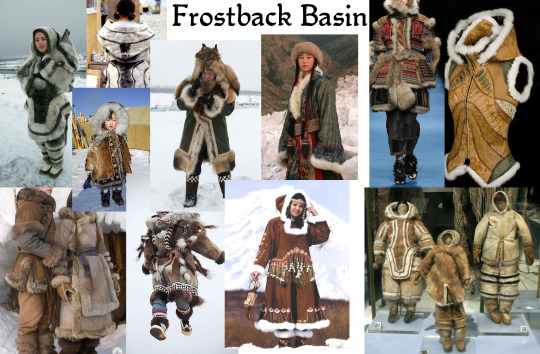
The Dalish (1/2/3/4/5)
Well, for the Dalish I had MANY ideas, among them think about adding traditional clothes from some tribes, native Brazilian/American, African, Hawaiian, Inca, Aztec and Mayan
Remembering that I made a great mix of traditional clothes from several tribes and not just one, and that I also have 0 intention of disrespecting any of them, if I have put something wrong or disrespectful you can be free to alert me
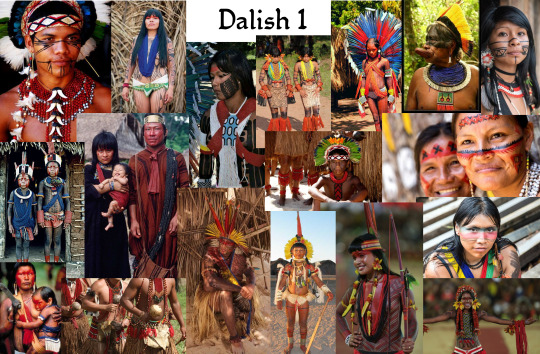

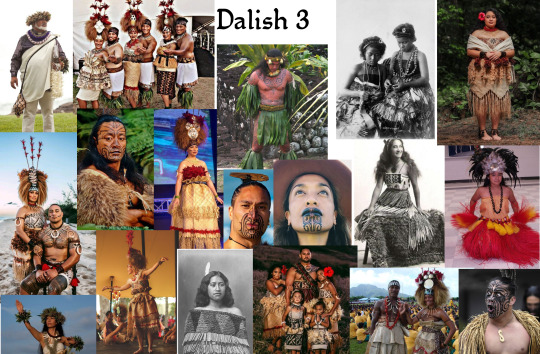
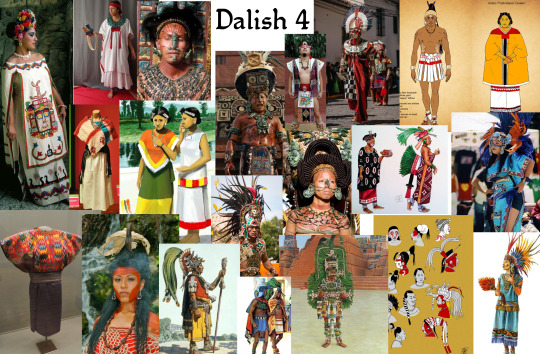
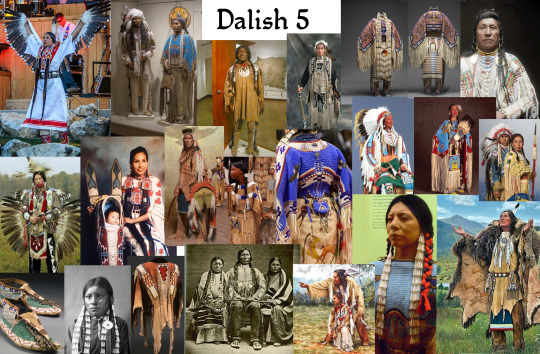
Orzammar
I knew little about Turkey, but when I went to research I ended up enchanted with some of the traditional clothes when I went to research about it and I thought that this style would go well with Orzammar
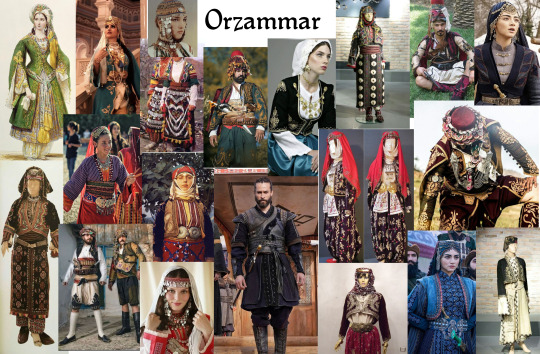
Par Vollen
For Par Vollen, I had a bit of trouble finding it, but I think clothing a little bit closer to the ancient Egyptian style would be something interesting. The light fabrics, the golden jewels adorning the body, idk, I like that idea
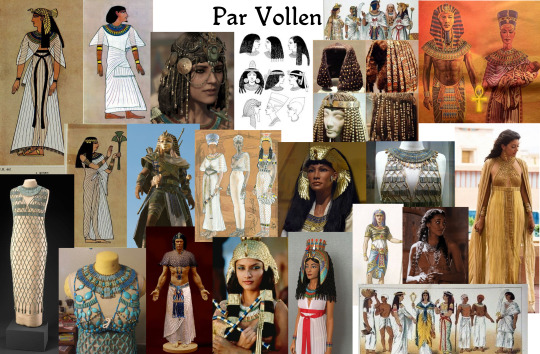
Rivain
I was doing some research again and found that part of Rivain's look was inspired by traditional clothing from Islamic Spain and Southeast Asia , so I looked around a bit for something to put here and add one more kingdom to the list
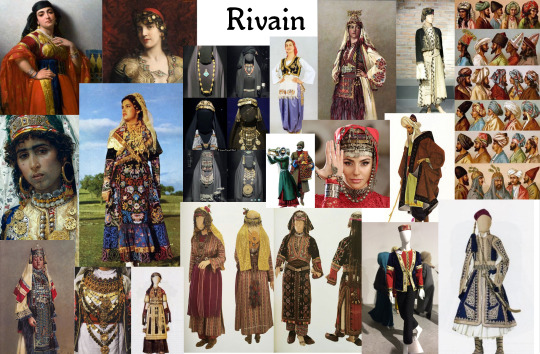
I hope you people enjoyed! Soon I will add more realms as soon as I finish my research
#dragon age fan art#dragon age 2#dragon age origins#dragon age#dragon age awakening#dragon age inquisition#tevinter#orlais#ferelden#frostback basin#antiva#nevarra#Rivain
4K notes
·
View notes
Note
what is your opinion on throwing tea into harbors?
I'm all for it.
My only question would be: For whose freedom do you throw the tea into the harbor? If your revolution fails to liberate the most vulnerable and oppressed people in your social order, is it a successful revolution?
The United States of America abolished chattel slavery 61 years after Haiti, 42 years after Chile, and 31 years after the British Empire. Was our revolution really that successful? Was it even good news for the most marginalized--the Black and indigenous Americans who were dehumanized by our Constitution?
So, yes, let us never be afraid to throw tea in the harbor. But let us be careful whose tea we throw into the harbor, and consider not just the thrills of revolution, but also the governance that must come after.
2K notes
·
View notes
Note
Do the ethnostates inherent in major fantasy ever feel real weird to you? You’ve got elftopia (full of elves, where everyone speaks elf and worships the elf gods), orc-hold (full of orcs and maybe their slaves, where everyone speaks orc and worships the orc gods), and dwarfton (made by the dwarves! for the dwarves!).
You might have some cosmopolitan areas, usually human-dominant, but those are usually rare enough in-setting that they need to be pointed out separately. Is this just based on a misunderstanding of the medieval era, and the assumption that countries were all racially homogenous?
This has been bouncing around my brain the last little while. Do you have any thoughts on that? Is it just in my head?
I think what you've noticed is a quirk of derivative fantasy writing, which like a lot of hangups with the genre originates in people trying to crib Tolkien's work without really understanding what he was going for:
Though it contains a lot of detail, Tolkien's world is not grounded. It functions according a narrative logic that changes depending on what work in particular you're focusing on at the time (The Hobbit is a fairytale full of tricks and riddles, Lord of the Rings is a heroic epic, The Silmirilion is a legendary history).
One of the reasons the races are separate is to instill the feeling of wonder in the hobbits as POV characters for the reader, other folk live in far off places and are supposed to feel more legendary than our comparatively mundane friends from the shire. The Movies captured this well where going east in middle earth was like going back in time to a more and more mythologized past.
In real life, people don't stay static for thousands of years, no matter how long their people live. They meet, mingle, war and trade. Empires rise and fall creating shrapnel as they go, cultures adapt to a changing environment. This means that any geographic cross section you make is going to be a collage of different influences where uniformity is a glaring aberration.
What the bad Tolkien knockoffs did was take his image of a mythical world and tried to make it run in a realistic setting. Tolkien can say the subterranean dwarven kingdom of Erebor lasted for a thousand years without having to worry about birthrates or demographic shifts or the logistics of farming in a cave because he's writing the sort of story where those things don't matter. D&D and other properties like it however INSIST that their worlds are grounded and realistic but have to bend over backwards to keep things static and hegemonic.
Likewise contributing to the "ethnostate" feeling is early d&d (backbone of the fantasy genre that it is) being created by a bunch of White Midwestern Americans who were not only coming from a background of fantasy wargaming but were working during the depths of the coldwar. Hard borders and incompatible ideologies, cultural hegemony and intellectual isolation, a conception of the world that focused around antagonism between US and THEM. These were people born in the era of segregation for whom the idea of cultural and racial osmosis was alien, to the point where mingling between different fantasy races produced the "mongrelman" monster, natural pickpockets who combined the worst aspects of all their component parts, unwelcome in good society who were most often found as slaves.
This inability to appreciate cultural exchange is likewise why the central d&d pantheon has a ton of human gods with specific carveouts for other races (eventually supplemented with a bunch of race specific minor gods who are various riffs on the same thing). Rather than being universal ideals, the gods were seen as entities just as tribalistic as their followers.
626 notes
·
View notes
Text
I think it is an understandable but fraught tactic to try to show to the liberal the position they are occupying by using historical examples which are associated with widely understood outrage or like, which are now understood to have "been bad." I'm going to use the internment of japanese americans because I'm japanese american and I think it's like, my lane to do so. you can absolutely be like "liberals who agree with this lesser-evilism would have absolutely been passive towards japanese internment" and I completely agree but the thing is that they WERE it's WHY IT HAPPENED. if america had been burned to the ground at the time we would never have gotten here in the first place. the liberal position is based on understanding historical atrocity through the clarity of hindsight - they can see that Japanese Internment was Bad, but if you confront them with any of the countless ongoing atrocities that American Empire is committing then, well, we don't know all the facts, it's up for debate, they're not sure if that's really whats happening, etc etc etc, quibbling ineffectually into a position where they are allowed to passively sit by until the present wooshes past them into history and they are able to say "Wow, that was a horrible thing we did. Why didn't anyone stop them?" despite having been there and stared down the bodies themselves.
1K notes
·
View notes
Note
Hi, as a Slovak I was really surprised when I saw that you decided to include a Slovak character in your comics! Can I ask why you decided to do this? I love the Slovak rep of course, but it's kind of rare that Americans even know that my country exists (no offense meant ^^" )
Initially, the idea for Viktor's character was a vague sketch with few defining characteristics. There was not much there beyond 'Roscoe the bartender'.
I was doing a lot of reading about the early 20th century at the time in preparation for writing, and I remember being struck by how many immigrants, statistically, made up the combat forces of the US military during WWI. Many soldiers spoke only just enough English to understand the barking of their sergeants. (In retrospect, this isn't really a novel or surprising factor in the human hardship that wars and militaries both produce and feed on. It's kind of a factor in how gangs work too.)
Anyway, I ended up down a rabbit hole about why various groups of people were leaving Europe for distant shores at the time, and specifically why people within the Austro-Hungarian Empire were departing, only to end up at war with their own homeland in some cases. It got me thinking - beyond just how much war itself would change someone - how would that particular scenario affect someone's outlook on the world? What sort of strange ambivalence would it leave someone contending with?
Obviously, his name changed, and Viktor's character just sort of started snowballing into something more defined and specific from there. It's hard to intellectualize all such decisions (sometimes it's just that something feels right) but I guess that's more or less how he ended up being a farm boy from Slovakia.
(Also, Slovakia looks like a beautiful country and I'd love to visit it sometime.)
820 notes
·
View notes
Text
OK. I wrote some of this in a vent to @sparklywaistcoat, but I'm gonna say it here.
I'm less sad about there not being a Season 3 and feel more just tearful anger that once again studios and streamers truly don't give a fuck about art or what it means to people or to culture. It’s corporations who just want to reproduce the same boring shit for the same boring people and even when they have something that’s popular and loved, they just can’t see past their own very narrow worldview. I really did think that the second season was going to get chucked once HBO Max restructured and WB merged with Discovery. I was shocked that it ever got released.
There’s such a wonderful scope of art in this world, but streamers won’t give it the space it needs to breathe. So when you get something like OFMD or Reservation Dogs or Good Omens, it’s so hopeful and yet you just sit there in heartbreak, hoping it doesn’t go away, or that it can at least play out as the people who make it want it to. Sometimes it does and sometimes it doesn't, but we have to remember that even when it doesn't, it still means something.
Now, Hollywood has always been like this, but it’s still very hard to see art being treated so callously. It’s like when the Code came in and you look back and see all these lovely things, truly groundbreaking stuff, that got cut off at the knees because of the fucking mainstream conservatives who thought they knew what was best, and the Hollywood studios that went right along with them to keep selling their product.
But the studio system, and the Code, broke, and it is breaking again. We’re in line for a major bursting of cinematic art as creators escape from franchises and the mainstream, a la American Independent cinema. It is already happening. The new studio system, built on streamers and franchises, of which WB and HBOMax is a part, is collapsing. OFMD is a big sign of that—an openly queer, incredibly diverse TV show that kept pushing and pushing through eighteen episodes, that rejected queerbaiting, that rejected convention, and that built itself on being a gay pirate rom-com and was exactly that.
Queer media has done more than broken through. It has embedded itself in the culture in a way that it never did in the past. It's out from the underground without assimilation. OFMD is not the only part of that, but it is a part of it. And that's something that HBOMax, Zaslav, Hollywood, the studio system, the entire straight, cis, white, conservative, conventional mainstream world can absolutely never take away or push back into the closet. They will try, though, and they will lose. They already lost.
So, yeah, I'm angry and I'm sad, and they fucked Calypso's birthday. But we can chuck a fiddle at their heads to protect the people we love, and it isn't going to destroy our souls.
Our spirit will last throughout their entire fucking empire.
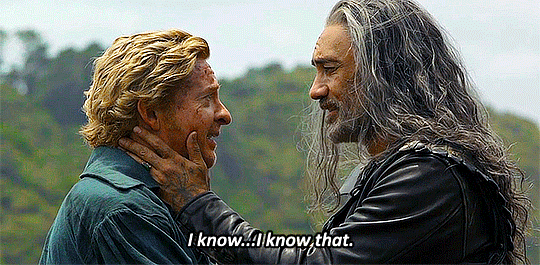
#ofmd#our flag means death#just my thoughts#queer media#queer cinema#stede bonnet#edward teach#izzy hands#the crew of the revenge#gif
444 notes
·
View notes